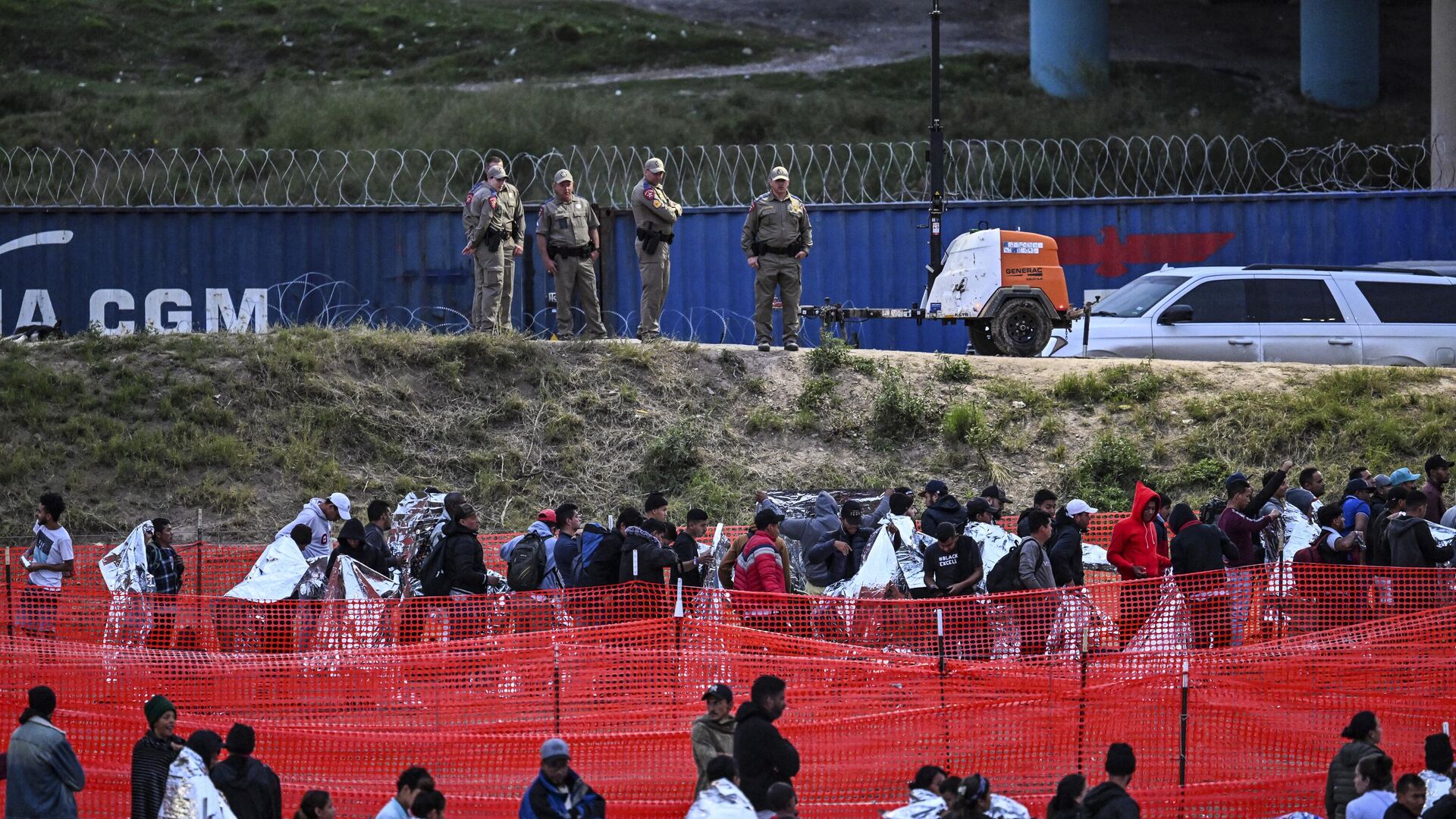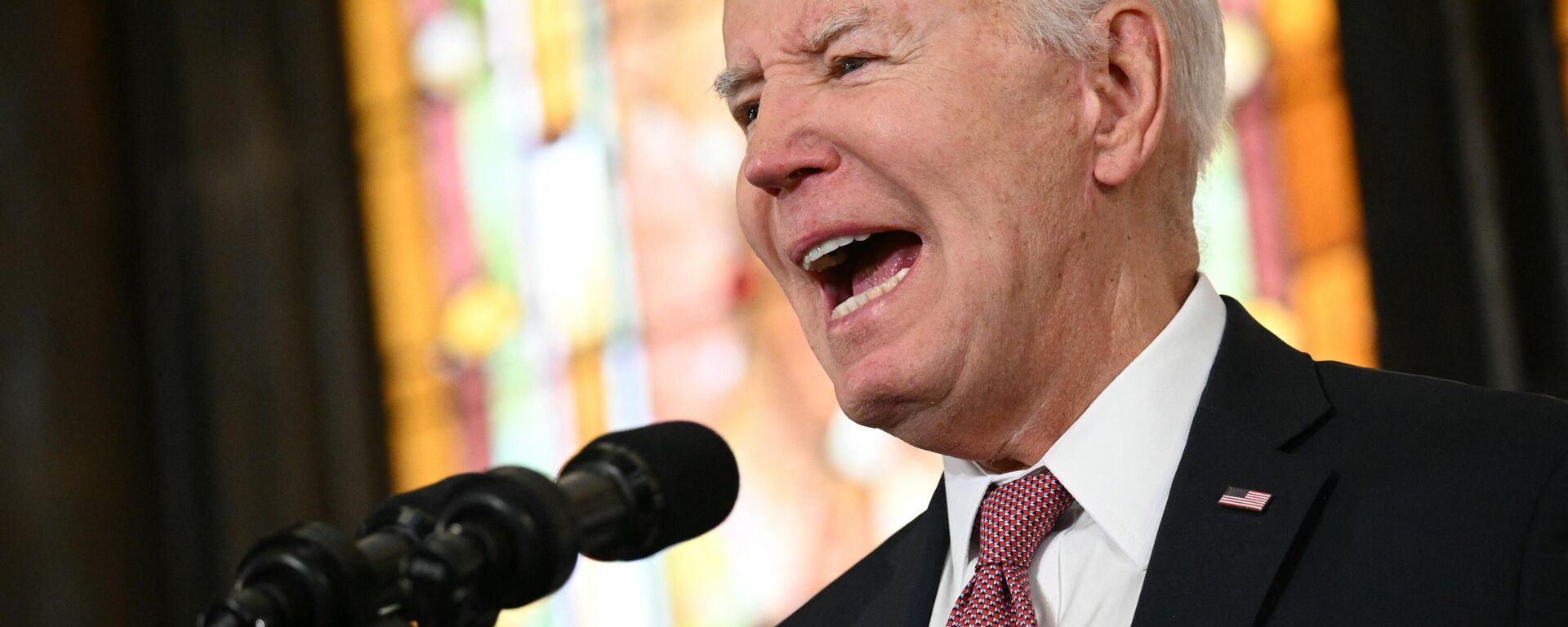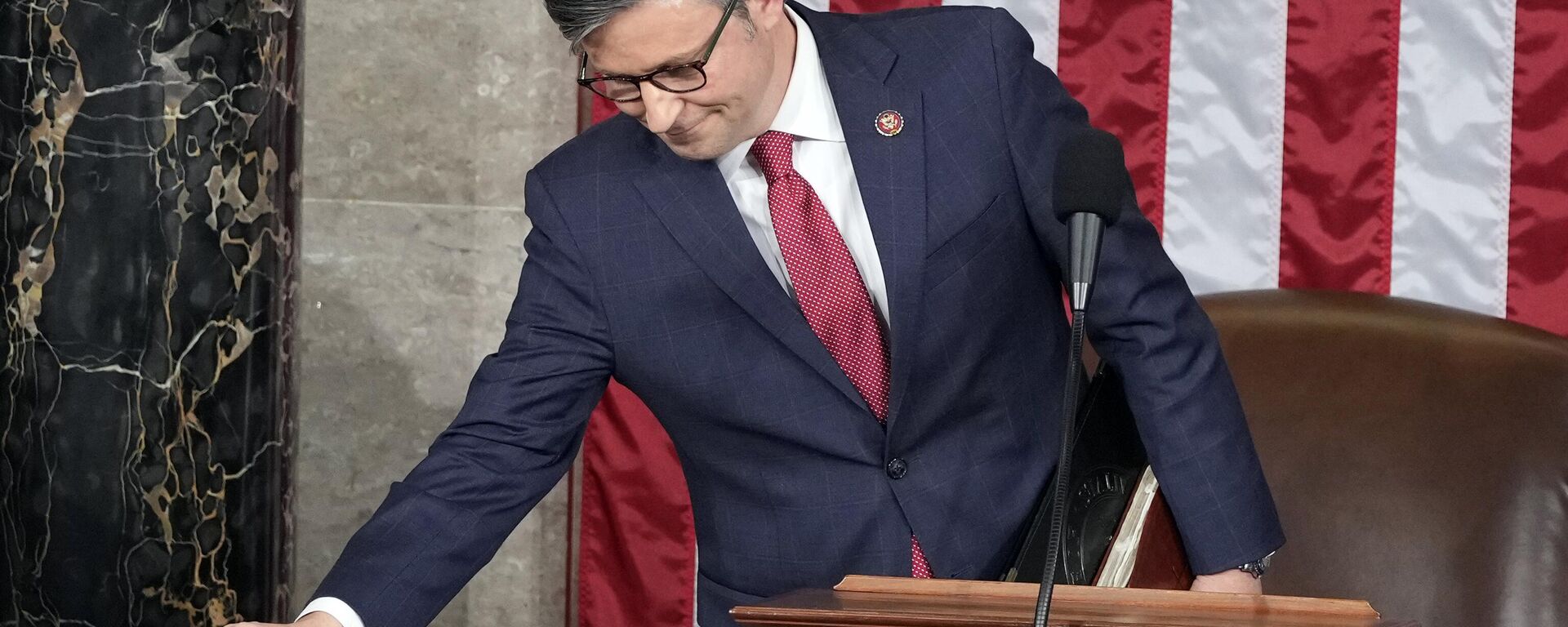Non-Starter: Why Senate's Border Security and Foreign Aid Bill 'Won't Even Receive a Vote' in House

© AFP 2023 / CHANDAN KHANNA
Subscribe
The US Senate has unveiled a bipartisan border security and foreign aid bill to try to break the deadlock on Capitol Hill. Republican House Speaker Michael Johnson, however, has stated that the legislation is even worse than the GOP expected. What's in the bill?
The long-anticipated Emergency National Security Supplemental Appropriations Act, 2024, was released on Sunday, prompting a heated debate among US Senate and House lawmakers.
Top Senate Republicans seem to be satisfied with the $118 billion bill, arguing that the measure "has direct and immediate solutions to the crisis at our southern border," as Minority Leader Mitch McConnell (R-KY) summed this up on February 4.
For his part, Sen. James Lankford (R-OK) published a three-page summary of the bill, insisting that "the new border security authorities will put powerful new tools in the border security toolbox of any administration willing to secure the border."
The bill is the result of months-long negotiations between senators. It is largely aimed at passing a hefty funding package for Washington's proxy war in Ukraine and for Israel's military effort. A similar bill got stuck in the US Congress in December.
One of the key conditions brought forward by the GOP for passing the measure was that the bill must include border security reforms to stop the influx of migrants that has dramatically grown since Joe Biden assumed the presidency.
Senate Majority Leader Chuck Schumer (D-NY) signaled that he wants to see the bill being passed quickly. To that end, he is expected to take the "first procedural step" on Monday to get it passed through the upper chamber. The first vote is scheduled for February 7 with 60 votes needed to push it forward.
However, Republican House Speaker Mike Johnson wasn't impressed by the measure. To the contrary, he said that the legislation is even worse than any GOP representative expected: “I’ve seen enough. This bill is even worse than we expected, and won’t come close to ending the border catastrophe the president has created." Per Johnson, the bill de facto ensures that "the US border never closes."
"If this bill reaches the House, it will be dead on arrival," Johnson concluded.
Why is the Bill Doomed?
One of the prerequisites to pass the bill set by House Speaker Johnson and like-minded conservative Republicans was the inclusion of provisions from the GOP-sponsored H.R.2 Secure the Border Act of 2023 that was introduced to the lower chamber in May 2023 and subsequently passed by House lawmakers.
Nonetheless, none of the measures described in detail by GOP representatives has been included in the "compromise" legislation. Furthermore, House Republicans have grown highly skeptical about sending billions to Ukraine, following the Kiev regime's botched counteroffensive and growing concerns over corruption and lack of oversight of funds sent to the Eastern European state.
The bill also disproportionately allocates more funding for US overseas military efforts: $60 billion for Ukraine and $14.1 billion for Israel, whereas it allocates just $20 billion for border security. Biden's original supplemental request included $14 billion for the border, meaning the Senate leaders expanded the funding by some $6 billion.
The proposed $20 billion for immigration enforcement includes the hiring and training of hundreds of Border Patrol agents and thousands of new officers to evaluate asylum claims; as well as funding shelters and services in cities across the US, which is deemed too little, too late by the House GOP.
The bill provides $650 million to build a border wall, whereas Congress appropriated at least $1.4 billion to the Department of Homeland Security (DHS) in each of fiscal years 2020 and 2021 to build a barrier system along the southwestern US border. House Republicans planned to wall off at least 900 miles of the US’ roughly 2,000-mile border with Mexico.
The legislation's asylum reform would mandate the expulsion of illegal immigrants only if the number of illegal border crossings exceeds 5,000 daily for a five-day average. House Republicans are seeking to tighten asylum standards by restricting asylum to only foreigners who cross at legal ports of entry.
The new bill would mandate expulsion when there are more than 5,000 daily crossings, whereas in September, October, November and December 2023, more than 10,000 people a day crossed the southern border, suggesting a tough job for border security which remains understaffed and underfunded, as per Republicans.
Besides allowing 5,000 illegal immigrants to enter a day, the bill would give automatic work permits to asylum recipients which would turn the process into "a magnet for more illegal immigration," Republicans argue.
The law clarifies the definition of the Biden administration's humanitarian parole system to stop abuse at the border, whereas Republicans seek to cancel the measure altogether. (The system allowed certain non-US citizens to enter or remain in the United States if they apply for admission but lack any legal basis for admission).
The new bill was drafted in "secrecy" by top senators, not allowing lawmakers to participate in the drafting, with Senate leaders forcing a quick vote on it to deny them "a real opportunity to read, digest, and debate the measure on its merits", as per Mike Lee, a senator from Utah.
House Republicans made it clear that once the law reaches the lower chamber it won't even go to a vote, according to House Majority Leader Steve Scalise: "Let me be clear: The Senate Border Bill will not receive a vote in the House," he said.
"I’ll say it again: Any deal from the Senate that explicitly allows for even one illegal crossing will be dead on arrival in the House. What we’ve seen is an insult to the American people who’ve been forced to bear the consequences of Democrats’ open-border policies," tweeted GOP Whip Tom Emmer of Minnesota.
"This Joe Biden/Chuck Schumer Open Border Bill is an absolute non-starter and will further incentivize thousands of illegals to pour in across our borders daily," echoed GOP Conference Chair Elise Stefanik of New York.
For his part, former President Donald Trump, the Republican frontrunner, has argued that the bill is unnecessary since Biden has the authority to close the border and stop the migrant flow under existing laws.
Commenting on the bipartisan Senate bill, Trump wrote on his Truth Social account: "Only a fool, or a radical left Democrat, would vote for this horrendous Border Bill, which only gives shutdown authority after 5000 encounters a day, when we already have the right to close the border now, which must be done."
The House opposition to the bill is likely to upend the Biden administration's push to fund Ukraine, something that many conservatives have lost their appetite for. In the eyes of the most conservative part of the House, the so-called Freedom Caucus, it's inappropriate to allocate a whopping $60 billion for the Kiev regime at a time of a domestic border crisis.
Things look differently, however, when it comes to Israel: while seeking to kill the Senate bipartisan border security and foreign aid bill, House Speaker Johnson announced a standalone $17.6 billion Israel funding package for the nation's military and US military forces in the region involved in Tel Aviv's Gaza war. The US lawmakers' effort indicates that Ukraine has been put on the backburner with domestic issues and the Israel war becoming a priority for the GOP-dominated House.





